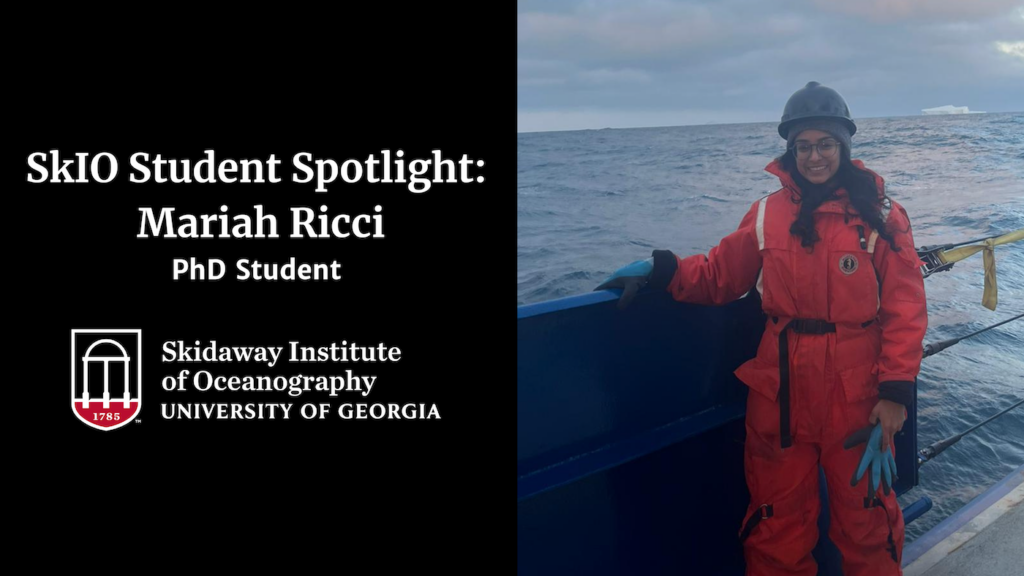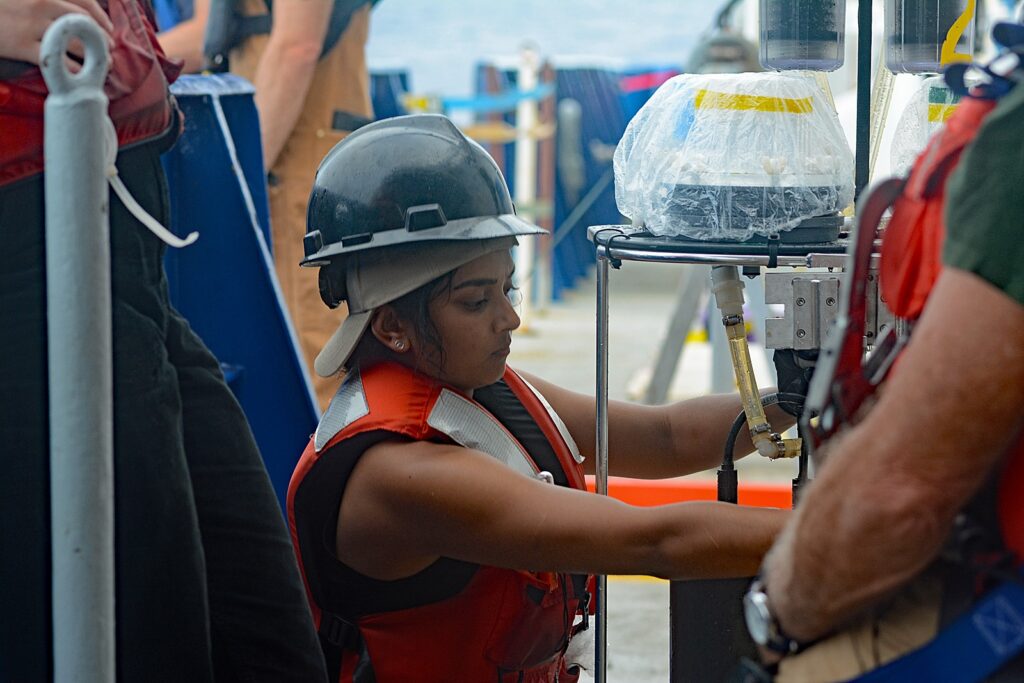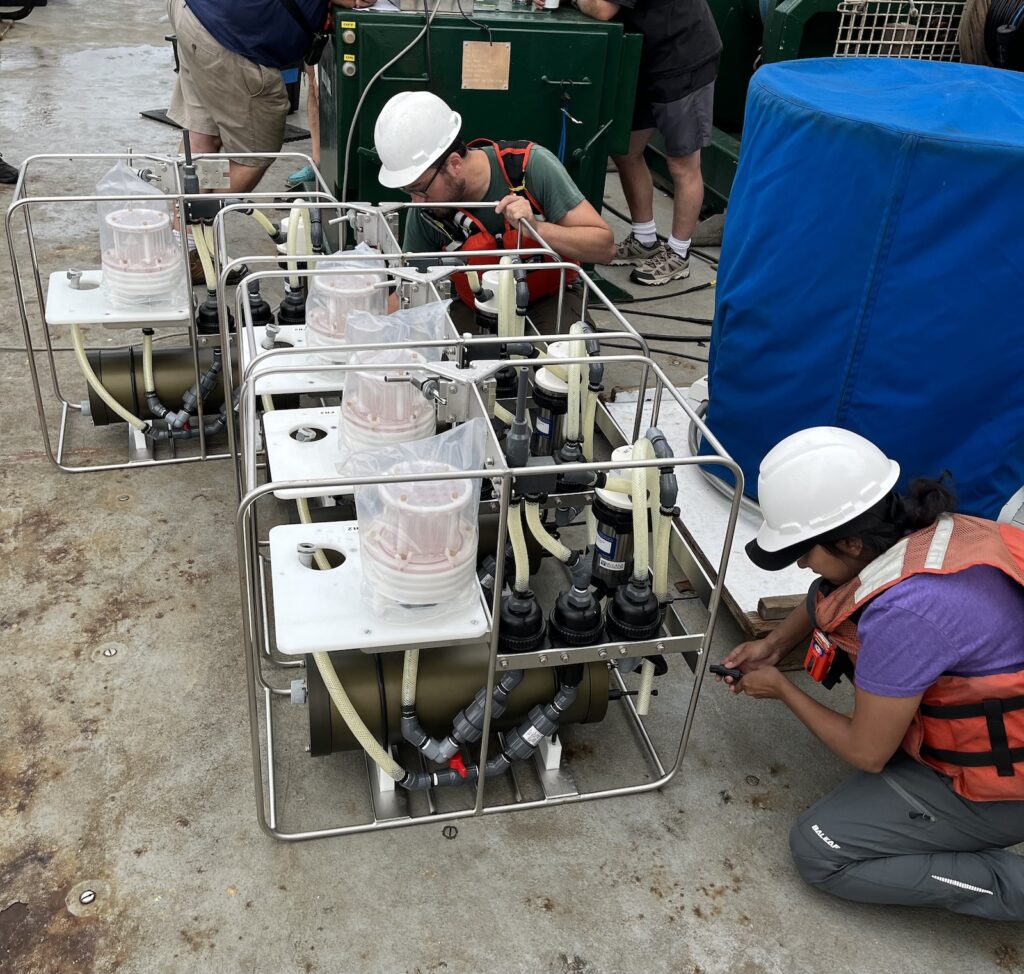
Minnesota native Mariah Ricci is a doctoral student working in the Marine Particle Lab with faculty member Daniel Ohnemus at the University of Georgia Skidaway Institute of Oceanography (SkIO). Ricci received her bachelor’s degree at The College of Saint Scholastica in Duluth, MN, where she majored in biochemistry and biology. Ricci studies the biogeochemistry of marine particulate trace elements.
SkIO: What are you researching at SkIO?
Mariah Ricci (MR): My dissertation focuses on understanding the sourcing, removal and internal cycling of size-fractionated marine particulate trace elements in the Pacific and Southern oceans. Marine particles can adsorb, transport and release trace elements, which play a key role in regulating global ocean biogeochemical cycles and, therefore, our understanding of ongoing climate change.

SkIO: What inspired your love of oceanography and, more specifically, your track of study?
MR: Though I grew up in the land of 10,000 lakes, I was exposed to the ocean and marine life at a young age. Like many children, I had a spirit of enquiry and desired to make sense of the world around me. Of course, the ocean was a topic of interest during my childhood. I would rent every book available in my school library about the ocean and gush about what I learned to my family. This is when I began to realize the importance of maintaining the health of our oceans and the numerous threats they face due to a rapidly changing environment. (My family got to hear about that too.) This understanding fueled my environmental awareness and motivated me to dive deeper into the issues I cared about.
I always knew I wanted to be a scientist, but I did not always know I wanted to be an oceanographer. When I was a freshman in college, I went on a trip to Kauai, HI, where I met a research scientist on the plane who was conducting field research there. I was inspired by what they did and by their commitment to their values. When I got back to school, I reflected on my own values, specifically environmental stewardship. I decided that pursuing a career in oceanography would allow me to uphold my values and pursue my interests.
During my junior year of undergraduate studies, I participated in a National Science Foundation Research Experiences for Undergraduates (REU) internship at the Bigelow Laboratory for Ocean Sciences. The REU marked my first exposure to marine science research, as my prior undergraduate research focused on radio astronomy. I thoroughly enjoyed the REU internship, which solidified my decision to pursue a PhD in oceanography. However, I remained open-minded about my specific research interests for graduate school, as I had a strong affinity for chemistry, physics and biology. Another key reason I chose a career in oceanography is its interdisciplinary nature. When searching for graduate programs and advisors, I prioritized the collective environment over specific research topics.

SkIO: Why did you choose UGA/SkIO?
MR: During my graduate school search, I attended the department’s recruitment weekend and was impressed by the Skidaway campus, as well as the faculty and students on both campuses. Shortly after the recruitment weekend, I presented research from my undergraduate REU internship at the 2020 Ocean Sciences Meeting in San Diego. During the conference, I was pleased to find that my now-advisor, Dan Ohnemus, along with another graduate student, made a deliberate effort to reconnect with me. Their engagement and the welcoming attitudes of the faculty and graduate students further convinced me that SkIO was the right choice for me.
SkIO: Describe a typical day in your life at SkIO.
MR: Every day is different. If I’m conducting an experiment, my day typically begins around 7 a.m. with a quick workout, followed by entering the lab by 8:30 a.m. I usually am running my experiment by 10 a.m. Lab days can be lengthy, lasting 10+ hours when I’m processing numerous samples, but there are downtimes during the experiment. While it runs, I often perform lab maintenance tasks, review newly published literature, attend meetings/seminars, and work on data analysis. It’s not only work. I make time for a quick lunch and usually take a brisk walk afterward to get some fresh air before returning to the clean lab.
SkIO: Where do you see yourself in 5-10 years?
MR: I hope to continue conducting research as a marine chemist. While I am currently exploring various pathways, I envision my future role incorporating marine conservation work.
SkIO: What do you do for fun, outside of your work/studies?
MR: Beyond the realm of science, I enjoy outdoor pursuits such as hiking and attempting to surf. At home, I’m the mother of two adorable cats and have an absurd number of plants. I also find solace in indoor hobbies like playing guitar, painting and reading.
SkIO: What advice would you give a high school or undergraduate student interested in a similar track? How can they get to where you are?
MR: I believe everyone’s journey is unique, so instead, I’d like to offer some practical guidance gained from my own:
- Cultivate a passion for lifelong learning. Embrace difficulties and find fulfillment in overcoming them. Struggling with certain subjects doesn’t define your potential as a scientist; everyone has areas that require extra effort.
- If you find yourself struggling, seek help. Pursuing a PhD requires a supportive community, so utilize available resources and advocate for yourself. No one else can navigate this journey for you.
- Also, it’s important to be humble. There will always be someone better than you at something. Rather than feeling discouraged, give your best effort and try to recognize your inherent worth beyond academic or professional achievements.
- Clarify your values and seek a career that aligns with them. Life is too short to settle for a role that doesn’t fulfill you. While not every aspect of your job may be enjoyable, it’s crucial to avoid despising your work altogether.
- Lastly, be tenacious; no one earns a PhD without embracing failure. Failure is crucial for growth and self-discovery. Your setbacks are as formative as your successes, so step out of your comfort zone and tackle new challenges. Overcoming life’s hurdles is largely about mindset. Shape your own narrative and believe in your capabilities.


